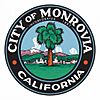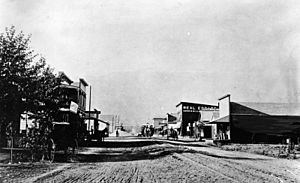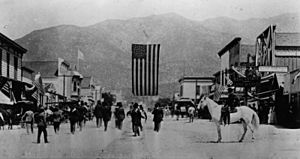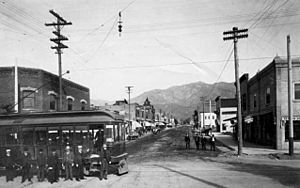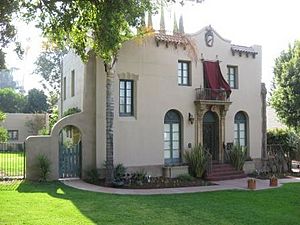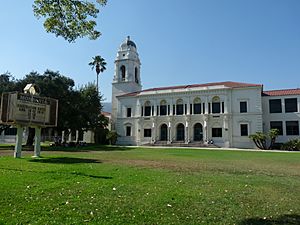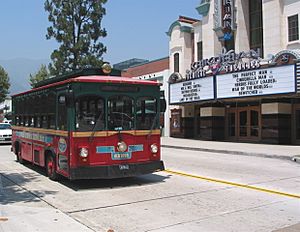Monrovia, California facts for kids
Quick facts for kids
Monrovia, California
|
|||
|---|---|---|---|
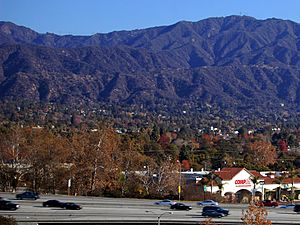
I-210 in Monrovia with San Gabriel Mountains in the background
|
|||
|
|||
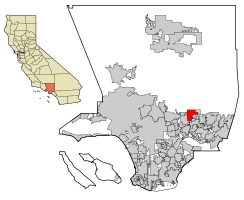
Location of Monrovia in Los Angeles County, California
|
|||
| Country | United States | ||
| State | California | ||
| County | Los Angeles | ||
| Incorporated | December 15, 1887 | ||
| Government | |||
| • Type | Council-Manager | ||
| Area | |||
| • Total | 13.74 sq mi (35.59 km2) | ||
| • Land | 13.63 sq mi (35.31 km2) | ||
| • Water | 0.11 sq mi (0.28 km2) 0.79% | ||
| Elevation | 571 ft (174 m) | ||
| Population
(2020)
|
|||
| • Total | 37,931 | ||
| • Density | 2,782/sq mi (1,074.2/km2) | ||
| Time zone | UTC−8 (PST) | ||
| • Summer (DST) | UTC−7 (PDT) | ||
| ZIP Codes |
91016–91017
|
||
| Area code | 626 | ||
| FIPS code | 06-48648 | ||
| GNIS feature ID | 1661049 | ||
Monrovia is a city in the foothills of the San Gabriel Mountains in Los Angeles County, California. It is located in the San Gabriel Valley. In 2020, about 37,931 people lived there.
Contents
History of Monrovia
Monrovia is one of the oldest cities in Los Angeles County. It was officially made a city in 1887. It started as a small area with orange farms. Now, it is a busy community with over 37,000 residents.
In 1769, a Spanish group called the Portolà expedition explored California. This was the first time Europeans explored this land. A priest named Juan Crespí was with them. He wrote down many details about early California.
In 1771, Spanish priests built the Mission San Gabriel Arcangel nearby. Later, in 1833, the Mexican government took over the mission lands. They sold these lands to private owners.
In 1841, parts of the land that would become Monrovia were given as grants. These grants were called Rancho Azusa de Duarte and Rancho Santa Anita.
Later, a man named William Norton Monroe bought parts of these ranches. Monrovia is named after him!
In 1875, a rich rancher named Elias Jackson Baldwin bought Rancho Santa Anita. He started selling off parts of his land. In 1883, William N. Monroe bought a large piece of land from Baldwin. Other people also bought land nearby.
In 1887, a railroad came to Southern California. This brought many new people looking for homes. Monroe and the other landowners decided to combine their land. They formed the Monrovia Land and Water Company in 1886. This company created the first town plan for Monrovia.
In 1903, the Monrovia News newspaper started. Also, the Pacific Electric train line opened. This train connected Monrovia to Los Angeles. It made it easy for people to live in Monrovia and work in Los Angeles.
In 1905, money from Andrew Carnegie helped Monrovia build a public park and buy a building for its city hall. The city hall building also housed the fire and police departments for many years. In 1956, a new library was built. In 2007, the people of Monrovia voted for an even newer library. Today, the library has many books and special areas for kids, teens, and adults.
In 1923, Monrovia started using a city council–manager system. This means the city has a council that makes laws and a city manager who runs the city's daily business.
In 1930, the Monrovia Airport opened. It was a small airport that was very friendly. Many famous pilots used it, and it was even used to film movies! Movies like The Fighting Pilot and The Big Noise (with Laurel and Hardy) were filmed there. The airport closed in 1953 because the land became too valuable.
Monrovia was also home to the very first version of McDonald's! In 1937, Patrick McDonald opened a food stand called "The Airdrome" near the old airport. Hamburgers cost ten cents! Later, he and his sons moved the stand and renamed it "McDonald's."
In 1995, Monrovia won the All America City Award. This award recognizes cities that work together to solve problems and improve their communities.
Geography and Wildlife
Monrovia covers about 13.74 square miles (35.5 square kilometers). Most of this area is land, with a small amount of water.
The city is right next to the San Gabriel Mountains. Many wild animals live in these mountains. You might see black bears, bobcats, coyotes, gray foxes, mountain lions, and mule deer. These animals sometimes wander into neighborhoods and even visit backyards! In 2024, a mother bear and her cubs became famous for regularly visiting a home in Monrovia to swim in their pool.
Population Information
| Historical population | |||
|---|---|---|---|
| Census | Pop. | %± | |
| 1890 | 907 | — | |
| 1900 | 1,205 | 32.9% | |
| 1910 | 3,576 | 196.8% | |
| 1920 | 5,480 | 53.2% | |
| 1930 | 10,890 | 98.7% | |
| 1940 | 12,807 | 17.6% | |
| 1950 | 20,186 | 57.6% | |
| 1960 | 27,079 | 34.1% | |
| 1970 | 30,562 | 12.9% | |
| 1980 | 30,531 | −0.1% | |
| 1990 | 35,761 | 17.1% | |
| 2000 | 36,929 | 3.3% | |
| 2010 | 36,590 | −0.9% | |
| 2020 | 37,931 | 3.7% | |
| U.S. Decennial Census | |||
The city's population has grown a lot over the years. In 2010, there were 36,590 people living in Monrovia. About 23.3% of the people were under 18 years old. The average age was about 37.9 years.
In 2000, there were 36,929 people. About 27.4% of the people were under 18. The average age was 34 years.
Economy and Jobs
Many companies have their main offices in Monrovia. These include Original Tommy's, Trader Joe's, Green Dot, and Naked Juice. Monrovia also has a "Technology Corridor" with companies like AeroVironment and Parasoft.
Top Employers in Monrovia
Here are some of the biggest employers in Monrovia:
| # | Employer | # of employees |
|---|---|---|
| 1 | Monrovia Unified School District | 724 |
| 2 | Trader Joe's | 341 |
| 3 | STAAR Surgical | 254 |
| 4 | Sierra Autocars | 244 |
| 5 | City of Monrovia | 238 |
| 6 | WorleyParsons | 218 |
| 7 | Home Depot | 209 |
| 8 | Ducommun | 182 |
| 9 | Vinyl Technology | 179 |
| 10 | Amada Myachi America | 164 |
Arts and Culture
The Upton Sinclair House is in Monrovia. This was the home of the famous author Upton Sinclair. It is now a National Historic Landmark.
Education in Monrovia
Public Schools
The Monrovia Unified School District runs the public schools in the city. Monrovia High School is the main high school.
Colleges and Universities
Monrovia is part of the Citrus Community College District.
Media
You can read local news in the San Gabriel Valley Tribune and Monrovia Weekly newspapers. KGEM-TV provides local television programs, mostly for cable viewers.
Transportation
Major roads in Monrovia include Foothill Boulevard and Huntington Drive. Huntington Drive is part of the historic Route 66. The Foothill Freeway (I-210) also runs through the city.
In 2016, a new light rail station opened in Monrovia. It is called Monrovia station and is served by the Metro A Line. This station is where the old Santa Fe Depot used to be.
Notable People from Monrovia
- Allen Allensworth, American chaplain and colonel
- Kenny Baker, singer and actor
- Corie Blount, basketball player
- Cisco Carlos, Major League Baseball pitcher
- Jason Earles, actor
- Mary Ford, vocalist and guitarist
- Jim Fuller, guitarist for The Surfaris
- Prince Gomolvilas, playwright
- Dean R. Hirsch, president of World Vision International
- Ernie Johnson, former baseball player
- Ian Johnson, American football player
- Katie Johnson, Mexican-American soccer player
- Anna H. Jones, African American educator and activist
- Steven Kiyoshi Kuromiya, gay rights activist
- Ellis McCarthy, defensive tackle for Miami Dolphins
- Corky King, founder of Summum
- Scott Land, puppeteer/actor
- Don Mankiewicz, screenwriter and novelist
- Francis M. Pottenger, Jr., nutrition researcher
- Kim Rhode, Olympic gold medalist in shooting
- Thomas J. Sargent, 2011 Nobel Prize in Economics
- Upton Sinclair and Mary Craig Sinclair, authors and producers
- Jacob Smith, actor
- William A. Spinks, champion billiards player and avocado farmer
- Henry B. Walthall, actor
- The Fabulous Wonder Twins, entertainers
- Ashley Sanchez Professional Soccer Player
See also
 In Spanish: Monrovia (California) para niños
In Spanish: Monrovia (California) para niños
 | Georgia Louise Harris Brown |
 | Julian Abele |
 | Norma Merrick Sklarek |
 | William Sidney Pittman |



